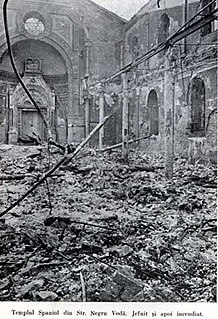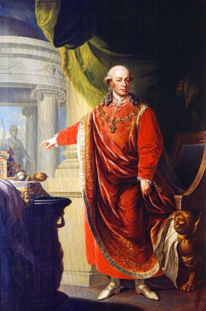 W
WThe 1907 Romanian Peasants' Revolt took place between 21 February and 5 April 1907. It started in northern Moldavia and, after three weeks in which it was localized in that area, it quickly spread, reaching Wallachia, including as far as Oltenia. The main cause was the discontent of the peasants over the inequity of land ownership, which was in the hands of just a few large landowners.
 W
WThe 2012 Romanian protests were a series of protests and civil manifestations triggered by the introduction of new health reform legislation. In particular, President Traian Băsescu criticized the Deputy Minister of Health, Raed Arafat, on a Romanian television broadcast. The protests became violent, with both protesters and members of the Gendarmerie sustaining injuries during their clashes. On the morning of 5 February 2012, Prime Minister Emil Boc announced his resignation because of the protests. He said that his decision would release the tension in the country's political and social situation.
 W
WThe 2012–2015 unrest in Romania refers to a prolonged period of civil unrest and political scandals in Romania, which took magnitude after the second half of the 2000s. The wave of civil demonstrations started in January 2012, once with the introduction of a new health reform legislation. The protests were fueled by the austerity measures applied in May 2010, but also by the unpopularity of Băsescu-backed Boc government. The demonstrations were characterized by widespread rioting and acts of vandalism. The political situation precipitated, so Prime Minister Emil Boc decided to step down on 6 February 2012.
 W
WThe 2015 Romanian protests began on 3 November, when more than 15,000 people protested in front of Victoria Palace—the headquarters of the Romanian government—blocking traffic in Victory Square.
 W
WThere have been numerous protests against the Romanian Government between 2017 and 2019. In January 2017, days after the government of the Grindeanu Cabinet was sworn into office in Romania, protests took place throughout the country against ordinance bills that were proposed by the Romanian Ministry of Justice regarding the pardoning of certain committed crimes, and the amendment of the Penal Code of Romania. At the heart of these protests is the community Corruption Kills, founded by Florin Bădiță, who alongside other civic groups organized what proved to be the largest protests since 1989, thus realizing the "Revolution of our generation".
 W
WThe 2020 Ditrău xenophobic incident refers to the incident that started on 26 January 2020 in the village of Ditrău, Harghita County, in Romania, in which around 1,800 ethnically Hungarian locals protested the employment of two, later three Sri Lankan workers by the bakery Ditrói Pékség. The locals, led by the chaplain of the village, protested that the bakery's working conditions dissatisfied them and, as well as feared that the immigrants could "impose their culture" and "threaten the Hungarian local ethnic identity". On 11 February, a petition signed by 1,800 people was sent to the town hall of the village with several requests, among them, the improvement of these working conditions, the end of immigration to the village and compensations and apologies to the population.
 W
WThe Legionnaires' rebellion and the Bucharest pogrom occurred in Bucharest, Romania, between 21–23 January 1941. As the privileges of the Iron Guard paramilitary organization were being cut off gradually by the Conducător Ion Antonescu, its members, also known as the Legionnaires, revolted. During the rebellion and pogrom the Iron Guard killed 125 Jews, and 30 soldiers died in the confrontation with the rebels. Following this, the Iron Guard movement was banned and 9,000 of its members were imprisoned.
 W
WThe Revolt of Horea, Cloșca and Crișan began in the Metaliferi Mountains, Transylvania, but it soon spread throughout all Transylvania and the Apuseni Mountains.
 W
WThe Tatarbunary uprising was a Bolshevik-inspired peasant revolt that took place on 15–18 September 1924, in and around the town of Tatarbunary in Budjak (Bessarabia), then part of Romania, now part of Odessa Oblast, Ukraine. It was led by a pro-Soviet revolutionary committee which called for the creation of a Moldavian Soviet Republic and an end to "Romanian occupation".
 W
WThe Wallachian Revolution of 1848 was a Romanian liberal and nationalist uprising in the Principality of Wallachia. Part of the Revolutions of 1848, and closely connected with the unsuccessful revolt in the Principality of Moldavia, it sought to overturn the administration imposed by Imperial Russian authorities under the Regulamentul Organic regime, and, through many of its leaders, demanded the abolition of boyar privilege. Led by a group of young intellectuals and officers in the Wallachian Militia, the movement succeeded in toppling the ruling Prince Gheorghe Bibescu, whom it replaced with a Provisional Government and a Regency, and in passing a series of major progressive reforms, first announced in the Proclamation of Islaz.
 W
WThe uprising of 1821 was a social and political rebellion in Wallachia, which was at the time a tributary state of the Ottoman Empire. It originated as a movement against the Phanariote administration, with backing from the more conservative boyars, but mutated into an attempted removal of the boyar class. Though not directed against Ottoman rule, the revolt espoused an early version of Romanian nationalism, and is described by historians as the first major event of a national awakening. The revolutionary force was centered on a group of Pandur irregulars, whose leader was Tudor Vladimirescu. Its nucleus was the Wallachian subregion of Oltenia, where Vladimirescu established his "Assembly of the People" in February.